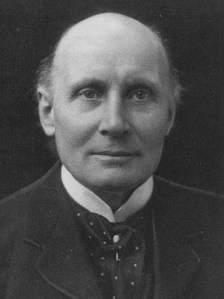Is it enough to chase happiness in life? Numerous philosophers have argued that, for a deeply satisfying experience of life, something more is required, something founded on substantial personal growth, rather than a preference for a particular ephemeral feeling that manifests in a constant effort to spend a lot of time in the desired emotional state. Is it possible that the “pursuit of happiness,” so central to American, and indeed, much of contemporary Western values, may actually get in the way of attaining life’s greater riches?

A. N. Whitehead said learning is impossible without the desire to learn. This matters because all personal growth requires us to learn something. (Image: public domain)
I have already argued, in “Religious Conversion Can Block Self-Discovery,” that a desire for spiritual salvation in the religious sense can seriously impede a person’s growth process. Here I will make the case that thoughtlessly chasing happiness (in the materialistic sense of money, entertainment, possessions, and social status) has a similar hindering effect. It is worth noting that “the pursuit of happiness” in this mundane manner may be a crude version of the creative person’s sophisticated use of subtle moods or feeling tones to enhance both their creativity and their ability to remain productive.
English mathematician and philosopher Alfred North Whitehead touched on the problem when he outlined his process approach to a philosophy of education. He saw the acquisition of knowledge as a growth process and claimed learning is impossible without a desire to learn on the part of children. There are three stages to the process. First, the learner enters a stage of romance, a period of being in love with learning and the objects of study. In time, the learner develops rational precision, the ability to employ rigorous thought. Finally, there emerges the capability to generalize from the body of ingested knowledge.
The key idea lies at the beginning, the difficulty of acquiring knowledge without the conscious desire to learn. What is so important about acquiring knowledge? All growth, whether emotional, psychological, or intellectual, involves gaining knowledge of some kind. If you are mindlessly preoccupied with chasing materialistic happiness, what are you learning?
Biographer Ray Monk in his two-volume study of Bertrand Russell writes: “people are moved as often by blind and unconscious impulses as by conscious and directed desires. Traditional liberalism has assumed too readily that people know what motivates them, when much of the time they do not. Furthermore, there has been too much emphasis in traditional liberal thought on the desire for happiness and too little on what Russell calls the ‘principle of growth,’ which he describes as ‘an instinctive urgency leading [people] in a certain direction, as trees seek the light.'”
Russell seems to have in mind something like the genuine human will – definitely “an instinctive urgency” – that emerges from the authentic self, which comprises our unique set of emotionally important ideas. The self naturally seeks expression; it wants to put its emotionally important ideas out into the world; it always “seek[s] the light.” It pursues life-long self-realization, the most important “principle of growth.”
Russell asserted, “This intimate centre in each human being is what imagination must apprehend if we are to understand him intuitively. It differs from man to man, and determines for each man the type of excellence of which he is capable.”
Russell was not particularly introspective, and did not carry his powerful idea forward to include the insight that we must learn to see this “intimate centre” within ourselves. Human beings have the peculiar quality of being partly unconscious. The way we perceive our own intimate centres – our own, at least partially unconscious, selves – is by learning. In this special case, we are dealing with self-discovery. We must come to know ourselves.
However, as Whitehead has pointed out, learning is impossible without the desire to learn. If you are casually wrapped up solely in the materialistic pursuit of happiness, you are not consciously committed to the growth process of learning about yourself. The deeper satisfactions of the struggle for full self-realization are lost to you.
An impressive post, Thomas. I read somewhere that chasing happiness can be likened to a kitten chasing its tail. The more it chases are it, the further it gets away…
You make a good point, Lucinda. I think happiness seems to recede ahead of our efforts to capture it because we so often fail to comprehend our own genuine needs. Society eagerly provides us with a list of material things we are supposed to want, the gaining of which will, we are assured, make us happy. It is so easy to just buy in and go along with what appears to be the consensus opinion. The trouble is, everyone else is doing the same thing – just going along – so the widespread agreement on the value of things is usually an illusion. We work to gain something only to find it does not please as advertised, or feel unhappy because we cannot get our hands on the object of our imagined desire.
A good example of this is the unquestioned assumption that international travel is absolutely a happy-making activity. Yet only 25% of Americans, the richest society on Earth, have passports! Obviously, there are far more unacknowledged “homebodies” than the hype about travel would lead you to believe.
Wise people learn enough about themselves to recognize their authentic path in life, and then walk it to the best of their ability.